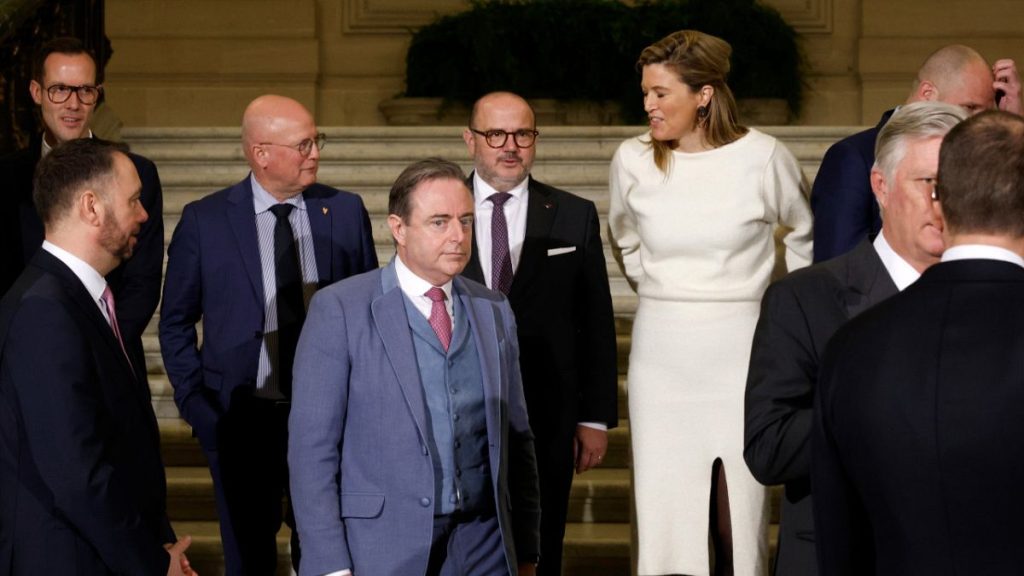Belgium Embarks on a New Political Era Under Nationalist Leadership
After protracted negotiations spanning over seven months, Belgium has ushered in a new coalition government under the leadership of Flemish nationalist Bart De Wever. This monumental shift marks the first time a nationalist from the Dutch-speaking Flanders region has ascended to the premiership, signifying a potential realignment of the country’s political landscape. The coalition, a unique blend of ideologies, comprises De Wever’s N-VA party, the centrist Christian Democrats, the leftist Vooruit, the francophone centre-right Reformist Movement, and the centrist Les Engages. This eclectic mix underscores the complexities of Belgian politics and the challenges De Wever faces in maintaining cohesion within his government. The formation of this government follows the June 2024 parliamentary elections, which resulted in a fragmented political landscape, necessitating extensive negotiations to forge a governing majority.
De Wever’s appointment is not without its ironies. He has spent much of his political career criticizing the Belgian federal government, the very institution he now leads. His long-standing criticism of King Philippe, a symbol of Belgian unity, further highlights the paradoxical nature of his premiership. This apparent contradiction underscores the complex relationship between Flanders and the rest of Belgium, a dynamic that De Wever will have to navigate carefully as Prime Minister. His assumption of power represents a significant shift, with a politician who has historically challenged the federal structure now at its helm. This unprecedented situation presents both opportunities and challenges for Belgium’s future.
De Wever’s political agenda centers on decentralization, aiming to shift power away from the federal government towards Belgium’s regions. This includes granting regional entities greater autonomy in managing jobseekers, reflecting the nationalist emphasis on regional empowerment. Furthermore, he advocates for an enhanced role for Belgium’s ten provinces in international diplomacy and trade. This focus on regionalism, while central to De Wever’s platform, may encounter resistance from his coalition partners, who hold differing perspectives on the balance of power between the federal government and the regions. Navigating these differing viewpoints will be crucial for the stability and effectiveness of the coalition.
The arduous 60-hour negotiation session that preceded the government’s formation highlights the significant policy differences between the coalition partners. De Wever’s insistence on cuts to social benefits and pension reforms, measures met with resistance from labor unions, underscores the rightward shift in Belgian politics. These proposed reforms, while potentially addressing economic concerns, could exacerbate social tensions and require careful management to mitigate potential negative consequences. Balancing fiscal responsibility with social welfare will be a key challenge for De Wever’s government.
The coalition agreement reflects a distinct rightward shift in Belgian politics, with a focus on right-wing socio-economic policies and a firm stance on immigration. The government is expected to implement measures to reduce public spending, control the state deficit, reform the labor market, and harmonize pension schemes. These measures align with broader trends in European politics, reflecting a growing emphasis on fiscal conservatism and market-oriented reforms. De Wever’s immigration stance, echoing the sentiments of many European leaders, focuses on controlling migration flows, a position likely to resonate with a significant portion of the Belgian electorate but potentially sparking debate and controversy.
De Wever’s rapid integration into the European political landscape was evident in his participation in an informal meeting of EU heads of state and government just hours after being sworn in. This demonstrates his intention to engage actively in European affairs and align Belgian policy with broader European trends. His stance on immigration, in particular, finds common ground with many of his European counterparts, potentially strengthening Belgium’s position within the EU on this issue. The coming months and years will reveal how De Wever’s leadership and the policies of his coalition government shape Belgium’s domestic and international trajectory, navigating the complex dynamics of regionalism, economic reform, and European integration.














